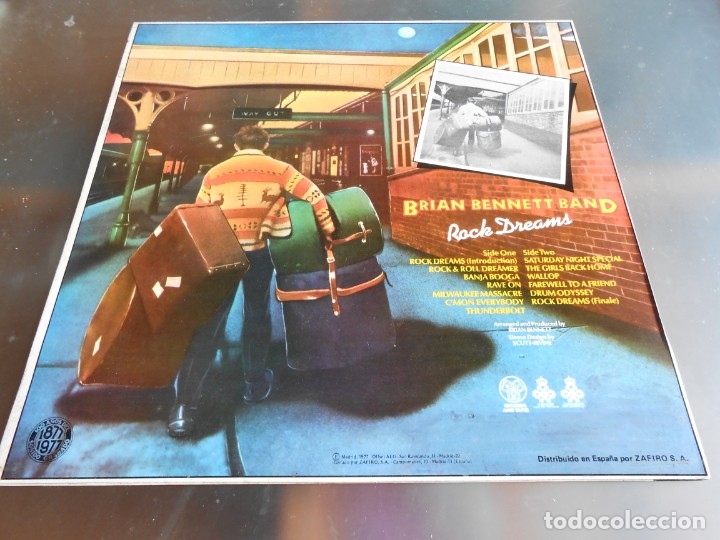

I had this idea for Voyage, and they said “great”… It cost about five grand, it was at CTS Wembley, and I think it sold about a hundred copies. Everything’s got to have a client at the other end, even if it’s a fictitious client that you haven’t met yet. It would be like, “Cliff’s doing a new album so we need three Miss You Nights and a Devil Woman.” It was still that mentality.īrian, did you take a different approach writing library music to your commercially released albums like Rock Dreams (1977) and Voyage (1978)?īB: “Not really a lot of difference.

The funniest was Eurovision time, because everybody had to enter one – every door you walked past was, “Oom-dah oom-dah” and I’d think, “Christ, it must be Eurovision again!” It was the end of those days, of selling songs. So, I’d get this box of Bruton albums to send to Sweden or wherever, and I’d walk past these people – Dave Dee was down there, Lynsey De Paul. ATV had a corridor of piano rooms downstairs, like I imagine the Brill Building would have been. He knew I wanted to be in a band, so he let me go into the songwriting meetings as well. WB: Eric Hall – the “monster monster” man – ran the songwriting publishing side. People were going to start clicking – where’s all this music coming from that’s on the telly? Where are all these adverts and theme-tunes coming from? And that’s what’s happened now. WB: When he got someone new in, he’d say to them, “Don’t tell anybody.” He could tell that, at some point, everybody was going to form a library company. One day, he said, “Do you want to do one side of an album?”īB: Robin did think it was the best kept secret in the world. It wasn’t, “Hello, do you want to do a library album?” So I learned a lot working there. Robin’s briefs were quite specific, all typed out: it’s got to be this, got to be that. An advertising company would phone up and they’d go, “We want to use BRH5 Side B Track 3,” and I’d have to get the master tape out, copy it onto a reel spool, and then walk round Soho and deliver it. They needed a tea boy, a guy to go to the post office, so I got the job, working for Robin. He’d formed Bruton by this time and there were only three people working there. When I left school at 16 you introduced me to Robin. WB: I probably remember more about it than you do. They’ll say, “When you were on KPM 1083…” I’m like, “What the…?!”

That would be on things like Grandstand, probably… other people know more than I do. Because the union banned library – and because we had to be members of the union – we took a rhythm section and went to Brussels and hired the Brussels Opera Orchestra. Where were the orchestral parts recorded?īB: A lot of it was done in Brussels. He left KPM because his brother Peter was made head of ATV Music, and his brother encouraged him to start again. We saw the best of it with Robin and KPM. It was only a small studio, but it was a good sound. And they had a good engineer – his name was Dave Clements. KPM recordings do have a lovely, rich sound compared to most other libraries.īB: The studio at 21 Denmark Street was good.
#Brian bennett band rock dreams RARE tv#
He’d send people up to Central TV and Anglia TV, take the new product up, buy them all lunch… have personal contact with the client. A fade, and what he called a button end – a brass “dah!” Then he’d just say, “Nice writing. ” It was usually eight, sometimes more, because he’d want an alternate end on some titles. There would be fine wines, and Robin would waffle on, but when it came down to the job at hand… “We’ve got to get eight titles. That was the KPM sound.īB: We had long lunches where Robin used to brief us on about five albums. Robin’s vision was to add a heavy rhythm section. We used brass sections – usually, when you heard brass sections it’d be jazzy and a bit tippity-tap, a bit light. We formed this little band of session guys: Duncan Lamont, Steve Gray, Dave Richmond, myself and Clive Hicks. He was a great pianist, and he said that Robin Philips at KPM was looking for a five-piece band that could play and write for each other. Tell me how you both got into writing library music?īB: I met Steve Gray doing session work. Brian’s son, Warren, was there, too, as he has taken the baton and continues to write library tracks – the Bennett dynasty were in conversation together for the first time. But we weren’t there to talk Shads – I wanted to hear about his days as one of the kings of library music, releasing stuff on KPM and Bruton that is now revered in hip-hop circles (Drake, Kanye West and Nas have all sampled him).

As I’ve loudly mentioned before, I’m a Shadows fan, and I was lucky enough to recently sit down with drummer Brian Bennett.


 0 kommentar(er)
0 kommentar(er)
